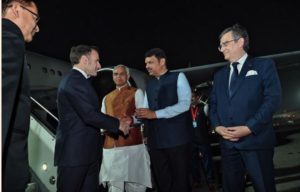Wahu Mobility is making strides in promoting electric transportation in Ghana.
The World Bank states that the cost of manufacturing two- and three-wheeled EVs has decreased, making them a viable option for promoting sustainability in transportation.

Valerie Labi, the co-founder and CEO of Wahu Mobility, a company that manufactures ebikes and provides delivery services, recently gave a talk at the University of Michigan's William Davidson Institute. In her speech, she shed light on a concerning fact - the average age of vehicles in Ghana is around 14 years old. This is a major issue that needs to be addressed, and Labi's company has taken on the challenge with a dual mission - to design vehicles that are suitable for African conditions and to offer reliable transportation solutions.
Labi emphasized the importance of mobility, especially e-mobility, in supplementing the lack of a public transportation system in Ghana. With private citizens being able to use vehicles, it can greatly improve accessibility and convenience for them. In fact, a recent study by the World Bank has shown that the cost of manufacturing electric vehicles (EVs), particularly two- and three-wheeled ones, has decreased significantly. This makes them a viable option for countries looking to move towards more sustainable forms of transportation.
In 2024, Wahu Mobility made history by opening Ghana's first electric vehicle assembly plant. This was made possible through the merger of two African women-owned companies - Cargo Bikes and Mana Mobility. Wahu Mobility specializes in electric bicycles that are specifically tailored to the terrain of Ghana. This initiative is part of their larger goal to empower riders across the country. As reported by Innovation Spark, the company received a significant investment from Blue Lion in 2023, which allowed them to expand their production, invest in research and development, focus on marketing, and increase their distribution.
One of the unique aspects of Wahu Mobility is the diverse team they have brought together. They have combined talent from Ghana with experienced engineers and designers from global brands like BMW and Audi. Labi, herself, is a serial impact entrepreneur who holds degrees from the University of Southampton and the University of Cambridge.
According to Wahu's website, their goal is to make sustainable transportation accessible to all. This is evident in their ride-to-own program, called ride-to-own. This program allows riders to lease-to-own a bike by making an initial deposit. The bike is then delivered within 2-3 business days, as long as there are e-bikes available. Registration for the bikes can be done through their mobile app, the Wahu Rider App. While maintenance is not free, it is subsidized, meaning riders only have to pay a portion of the repair costs.
In April 2024, Labi was invited to speak at the University of Michigan once again, this time by the William Davidson Institute. The event was open to the public and aimed to raise awareness about the impact of e-mobility in Africa. Labi shared her vision for Wahu Mobility and how they are challenging the status quo and creating a new competitive landscape for African innovation and engineering.
Aside from manufacturing EVs, there is also a great need for charging infrastructure in Ghana. Dr. Aruna Sivakumar, the director of the Urban Systems Lab, has highlighted this issue. As she writes for Energy Futures Lab, "the transition to electrification of road transport must be accompanied by appropriate policies to ensure that accessibility is not compromised." She also emphasizes the importance of considering transport planning principles to ensure equitable access for all, especially the low-income populations in developing countries.
In 2023, Impact Hub Accra, a social entrepreneurship and innovation center in Ghana, partnered with Siemens Stiftung to implement the Made In Ghana project. This project aimed to facilitate the creation of charging infrastructure, decarbonization of transportation, and bringing stakeholders into the funding equation. Will Senyo, the CEO of Impact Hub Africa, expressed his hope that investments in companies like Wahu Mobility will lead to a more sustainable and inclusive transportation system in Ghana. He also mentioned their collaboration with regional institutions, businesses, academics, and administration to work towards more sustainable, accessible, inclusive, and efficient urban transportation in the country.
In conclusion, Valerie Labi and her team at Wahu Mobility are paving the way for a greener and more accessible future for transportation in Ghana. With their innovative solutions and partnerships, they are making a positive impact on the environment and the lives of many Ghanaians.










